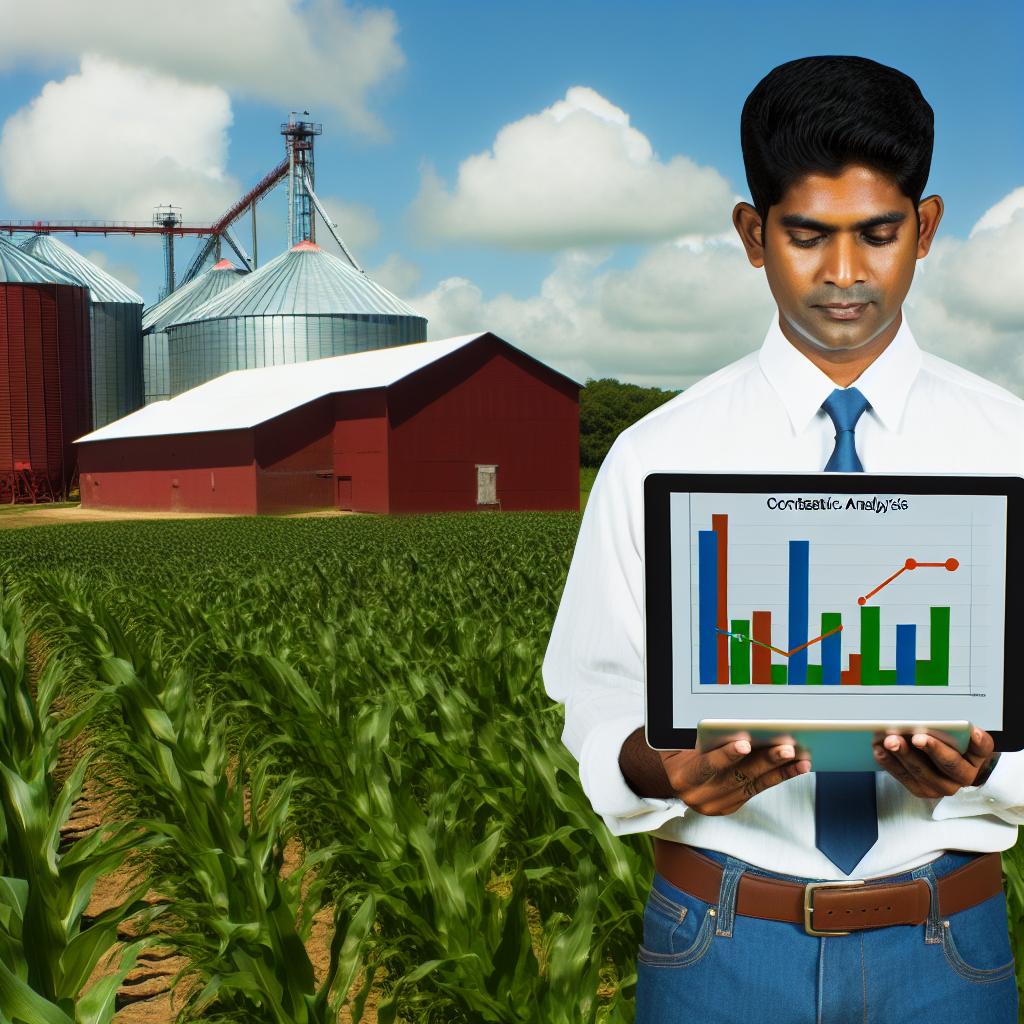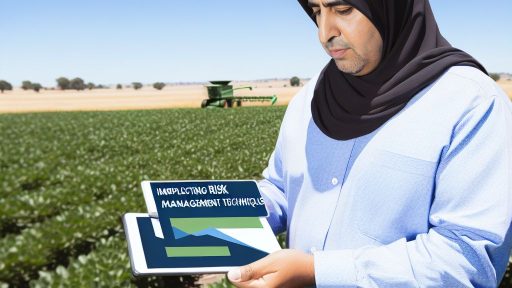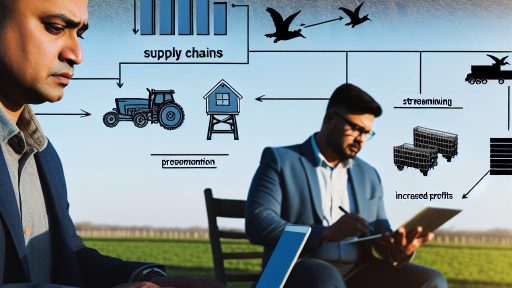Understanding the Importance of Data Analytics in Agribusiness
Defining Data Analytics in Agribusiness
Data analytics refers to the systematic computational analysis of data.
In agribusiness, it involves examining agricultural data to enhance decision-making.
This process helps farmers optimize their resources efficiently.
Enhancing Decision-Making
Data analytics significantly enhances decision-making in agribusiness.
It provides actionable insights based on historical and real-time data.
For example, farmers can predict crop yields more accurately.
Moreover, it informs them about the best planting times and techniques.
In turn, this leads to increased productivity and profitability.
Improving Resource Management
Effective resource management is critical in agribusiness.
Data analytics supports optimal use of water, fertilizers, and pesticides.
By analyzing weather patterns, farmers can adjust irrigation practices.
This adaptation not only saves costs but also conserves water.
Consequently, farmers reduce environmental impacts while maximizing yields.
Enhancing Supply Chain Efficiency
Data analytics plays a pivotal role in improving supply chain efficiency.
It helps identify inefficiencies and bottlenecks within the supply chain.
Transform Your Agribusiness
Unlock your farm's potential with expert advice tailored to your needs. Get actionable steps that drive real results.
Get StartedFarmers can analyze data to determine demand trends in real time.
This knowledge allows them to plan production accordingly.
As a result, they can minimize waste and enhance customer satisfaction.
Facilitating Risk Management
Risk management is essential in agribusiness.
Data analytics allows farmers to assess potential risks effectively.
It provides insight into factors like market fluctuations and climate change.
This understanding enables proactive strategies to mitigate risks.
For instance, farmers can diversify their crops based on predicted market needs.
Driving Innovation
Innovation is vital for growth in agribusiness.
Data analytics drives innovation by uncovering new opportunities.
Farmers can explore advanced technologies like precision agriculture.
These technologies rely on data analytics for improved outcomes.
Ultimately, this fosters sustainable farming practices and competitiveness.
Key Data Sources for Agribusiness
Soil Data
Soil data provides essential information for crop production.
This data includes nutrient levels and pH balance.
Farmers can leverage soil tests to enhance yields.
Additionally, satellite imagery helps visualize soil health.
Using soil data, farmers can make informed decisions on crop rotation.
Weather Data
Weather plays a crucial role in agribusiness success.
Farmers rely on weather forecasts to plan cultivation activities.
Accurate precipitation data can guide irrigation strategies.
Moreover, understanding temperature patterns supports crop selection.
Weather data can also mitigate risks associated with climate change.
Market Trends
Staying updated on market trends is vital for profitability.
Showcase Your Farming Business
Publish your professional farming services profile on our blog for a one-time fee of $200 and reach a dedicated audience of farmers and agribusiness owners.
Publish Your ProfileFarmers should monitor prices for crops and livestock.
Market analysis helps identify consumer preferences and demands.
Additionally, understanding competition aids strategic planning.
Effective use of market data maximizes financial returns.
Implementing Precision Agriculture: Technology and Data Utilization
Overview of Precision Agriculture
Precision agriculture enhances farming accuracy and efficiency.
This method integrates technology into agricultural practices.
Farmers can monitor and manage field variability effectively.
Consequently, they optimize crop production and resource use.
Technological Tools for Precision Agriculture
Farmers use GPS-guided machinery for planting and harvesting.
This technology enhances planting accuracy and reduces overlap.
Drones provide aerial imagery and real-time data on crop health.
Additionally, soil sensors measure moisture levels accurately.
These tools help in making informed irrigation decisions.
Data Collection and Analysis
Data collection is vital in precision agriculture.
Farmers gather data from various sources, including sensors and drones.
Data analysis allows farmers to identify trends and patterns.
With this information, they can adjust their farming practices.
Benefits of Data-Driven Decision Making
Data-driven decision making leads to increased yields.
Farmers can save costs by optimizing inputs like water and fertilizer.
Moreover, it helps in reducing the environmental impact of farming.
This approach promotes sustainable agribusiness practices.
Implementing Precision Agriculture on Your Farm
Beginning with precision agriculture requires careful planning.
Farmers should assess their current farm practices first.
Next, they need to invest in the appropriate technology.
Training staff on using these technologies is essential.
Finally, continuous evaluation of strategies leads to better outcomes.
Learn More: Soil Health Management Practices for Sustainable Farming
Building a Data-Driven Culture in Agricultural Enterprises
Understanding Data-Driven Decision Making
A data-driven culture focuses on using data to guide decisions.
This approach enhances operational efficiency in agribusiness.
Moreover, it helps stakeholders understand market trends.
For instance, farmers notice better crop yield patterns.
Consequently, they can make informed planting decisions.
Creating an Open Data Environment
Encouraging transparency improves collaboration among teams.
When data becomes accessible, it fosters trust and innovation.
Employees at all levels should feel empowered to share insights.
Furthermore, adopting cloud solutions can facilitate data sharing.
Such systems also provide real-time analytics on agricultural performance.
Training and Development Programs
Providing comprehensive training programs enhances data literacy.
Employees should learn how to interpret and analyze data efficiently.
Workshops teach practical applications of data in agriculture.
Showcase Your Farming Business
Publish your professional farming services profile on our blog for a one-time fee of $200 and reach a dedicated audience of farmers and agribusiness owners.
Publish Your ProfileMentorship can support individuals in leveraging data effectively.
Ultimately, a skilled workforce drives more informed decision-making.
Implementing Advanced Technology
Integrating technology is crucial for gathering and analyzing data.
For example, precision agriculture tools optimize resources.
These technologies improve overall productivity and sustainability.
Additionally, drones can monitor crop health and soil conditions.
Investing in such technology enhances competitive advantage.
Encouraging a Culture of Continuous Improvement
A data-driven culture thrives on feedback and adaptation.
Set benchmarks to gauge progress and successes.
Regular review meetings can identify areas for improvement.
Encouraging innovative ideas leads to better practices.
Continuous learning keeps the organization agile and responsive.
Measuring Success and Impact
Establish clear metrics to assess the effectiveness of strategies.
Track performance indicators to ensure alignment with goals.
Data analytics can reveal insights into operational improvements.
Sharing success stories motivates teams and stakeholders.
Ultimately, measurable success solidifies the value of a data-driven culture.
Delve into the Subject: Improving Crop Distribution with Effective Supply Chain Management
Case Studies: Successful Agribusinesses Leveraging Data
Innovating with Precision Agriculture
GreenFields Enterprises has transformed farming through precision agriculture.
They utilize drone technology to monitor crop health in real-time.
This approach allows them to apply fertilizers and pesticides selectively.
As a result, they reduced costs and increased yield significantly.
Optimizing Supply Chain Management
Harvest Innovations streamlined their supply chain using data analytics.
They implemented machine learning algorithms to forecast demand accurately.
This innovation decreased waste and improved delivery efficiency.
Consequently, they enhanced customer satisfaction and increased profits.
Enhancing Decision-Making with Big Data
FarmTech Solutions employs big data to improve decision-making processes.
They aggregate and analyze diverse data sources for comprehensive insights.
This analysis helps them identify emerging trends in the market.
As a result, they adjust strategies promptly to stay competitive.
Improving Crop Management with IoT
AgriSense integrates Internet of Things (IoT) technology into crop management.
They install sensors in fields to collect data on soil conditions.
This data guides irrigation and nutrient application practices effectively.
Consequently, they witness increased crop resilience and productivity.
Fostering Sustainability through Data Insights
EcoGrow has prioritized sustainability by leveraging data insights.
They analyze energy consumption patterns to reduce their carbon footprint.
This initiative promotes eco-friendly practices while maximizing efficiency.
Additionally, it positions them favorably within socially conscious markets.
See Related Content: Cost-Effective Pest Control Solutions For Farmers

Challenges and Solutions in Data Management for Agriculture
Understanding Data Complexity
Agribusiness faces numerous challenges with data management.
Showcase Your Farming Business
Publish your professional farming services profile on our blog for a one-time fee of $200 and reach a dedicated audience of farmers and agribusiness owners.
Publish Your ProfileData comes from various sources like sensors, drones, and weather stations.
This complexity can overwhelm many farmers and agribusinesses.
Therefore, effective data integration is crucial for success.
Data Quality Issues
One major challenge is ensuring data quality.
Inaccurate data can lead to poor decision-making.
Consequently, businesses often face financial losses.
Regularly auditing data sources can mitigate these issues.
Implementing Reliable Data Management Systems
Investing in a robust data management system is essential.
Such systems streamline data collection and storage processes.
They also enhance data accessibility for all stakeholders.
Moreover, cloud solutions can provide scalability and flexibility.
Utilizing Advanced Analytics
Advanced analytics can transform agricultural practices.
These tools help predict crop yields and optimize resource use.
Consequently, farmers can make informed decisions quickly.
Data visualization tools make trends and anomalies easily identifiable.
Ensuring Data Security and Privacy
Data security remains a significant concern in agribusiness.
Protecting sensitive information from cyber threats is crucial.
Implementing encryption and access controls can help safeguard data.
Additionally, training staff on security best practices is essential.
Adapting to Technological Advancements
The rapid pace of technological change presents challenges.
Businesses must stay updated with the latest advancements.
This adaptability allows companies to maintain a competitive edge.
Moreover, continuous training and education are vital for staff.
Building Collaborative Communities
Collaboration among agribusinesses can foster better data management.
Sharing insights and best practices enhances overall knowledge.
Outreach programs can also help educate farmers about data usage.
As a result, a supportive network leads to collective growth.
Discover More: Leveraging Technology To Improve Crop Yields
Future Trends in Data Analytics and Its Impact on Agribusiness
Embracing Precision Agriculture
Precision agriculture utilizes data to enhance farming efficiency.
This approach allows farmers to analyze soil health and crop needs.
As a result, farmers can target resources effectively.
For instance, sensors can monitor soil moisture levels in real-time.
Consequently, this data helps optimize irrigation schedules.
Leveraging Predictive Analytics
Predictive analytics identifies trends and forecasts outcomes.
Agribusinesses can use data models to predict crop yields.
This foresight aids in planning and resource allocation.
Additionally, predictive analytics can assess market demand changes.
Thus, businesses can adapt their strategies accordingly.
Integrating Artificial Intelligence
Artificial intelligence revolutionizes decision-making processes.
AI tools analyze vast datasets quickly and accurately.
Showcase Your Farming Business
Publish your professional farming services profile on our blog for a one-time fee of $200 and reach a dedicated audience of farmers and agribusiness owners.
Publish Your ProfileThis capability leads to more informed farming decisions.
Moreover, AI can assist in pest and disease detection.
As a result, farmers can act swiftly to protect their crops.
Utilizing Geospatial Data
Geospatial data enhances agribusiness planning and analysis.
Farmers can visualize data through maps and imagery.
This visualization aids in understanding land conditions and crop rotation.
Furthermore, geospatial tools can optimize land use and yield potential.
Consequently, farmers can make data-driven decisions about planting practices.
Enhancing Supply Chain Management
Data analytics improves supply chain efficiency.
By tracking product movement, businesses can minimize delays.
Data insights enable better inventory management decisions.
This approach reduces waste and optimizes storage practices.
Thus, companies can meet consumer demand more effectively.
Developing Data Privacy and Security Protocols in Agriculture
Understanding the Importance of Data Privacy
Data privacy safeguards sensitive information in agribusiness.
Furthermore, it protects farmers from potential data breaches.
This protection fosters trust among stakeholders.
Identifying Data Vulnerabilities
Agribusinesses must identify potential data vulnerabilities.
Start by evaluating current data handling practices.
Next, assess external threats to your data system.
Organizations can use audits to pinpoint weaknesses.
Additionally, technology can help identify these vulnerabilities.
Implementing Security Measures
Implement robust security measures to protect data.
Encrypt sensitive data to prevent unauthorized access.
Use firewalls to block malicious attempts to access data.
Regularly update software to address security flaws.
Moreover, establish strong password policies for users.
Training Employees on Data Security
Training employees is vital for maintaining security protocols.
Ensure that all staff understand data privacy regulations.
Provide practical training for recognizing phishing attempts.
Create a culture of awareness around data security issues.
Compliance with Regulations
Compliance with data privacy regulations is essential.
Familiarize yourself with relevant laws such as GDPR.
Implement necessary changes to meet these regulations.
Moreover, regularly review compliance practices to maintain standards.
Collaborating with Technology Partners
Collaboration with technology providers enhances data security.
Choose partners with strong data protection protocols.
Evaluate their capabilities in managing sensitive information.
In addition, establish clear agreements on data ownership and protection.
Regularly Reviewing Security Protocols
Regularly review and update your security protocols.
Conduct periodic audits to ensure compliance with policies.
Showcase Your Farming Business
Publish your professional farming services profile on our blog for a one-time fee of $200 and reach a dedicated audience of farmers and agribusiness owners.
Publish Your ProfileStay informed about new security threats and mitigation strategies.
Adapting to changing landscapes keeps your data secure.
Additional Resources
Enhancing smart farming through the applications of Agriculture 4.0 …
Agriculture Overview: Development news, research, data | World Bank




